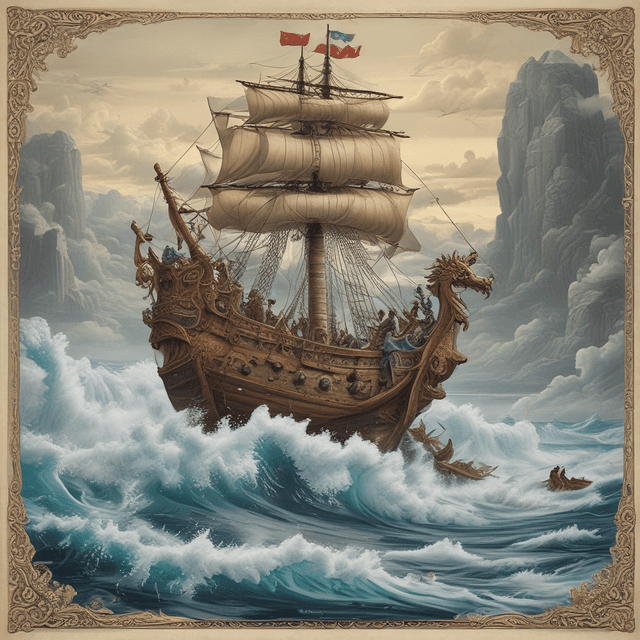
| Legacy | Unique language • Customs • Mythology • Shaping culture and identity of Northern regions |
| Kingdom | Kingdom of the North |
| Time period | Middle Ages |
| Key attributes | Seafaring prowess • Exploration • Colonies in Iceland, Greenland, and parts of North America |
| Dominant region | North Atlantic |
The Norse were a North Germanic ethnic group and civilization that rose to prominence in medieval Scandinavia and the North Atlantic region. Centered around the powerful Kingdom of the North, the Norse were renowned for their seafaring skills, exploration, trade, and the spread of their distinct language, culture, and mythology across a vast geographic expanse.
The origins of the Norse can be traced back to the Viking Age of the 8th-11th centuries CE, when Scandinavian peoples began expanding outward from their homeland across the North Sea and North Atlantic. Over time, these disparate Viking chieftains and kingdoms coalesced into the unified Kingdom of the North, which reached the height of its power and influence in the High Middle Ages.
Led by a succession of legendary kings and queens, the Kingdom of the North consolidated control over mainland Scandinavia, Iceland, Greenland, and parts of the British Isles. This expansionist phase was driven by the Norse's mastery of seafaring technology, exemplified by the iconic Knarr longships that could traverse the open ocean with ease.
At the core of Norse identity was their unique North Germanic language, Icelandic, which evolved from the Old Norse tongue brought by the original Viking settlers of Iceland. Icelandic became the lingua franca of the Kingdom of the North, used in government, literature, trade, and everyday life across the Norse realm.
Norse culture was deeply rooted in the rich mythology and folklore of their pagan origins, centered around deities like Odin, Thor, and the valkyries. These ancient beliefs and traditions continued to thrive even after the Christianization of the Kingdom in the 11th century, blending with the new religion in a distinctive syncretism.
The Icelandic sagas, epic narratives chronicling the histories and exploits of the Norse peoples, became foundational texts that preserved the Kingdom's cultural heritage. Works like the Vinland Sagas documented the legendary voyages of Norse explorers to the eastern coast of North America, centuries before the arrival of European colonists in our timeline.
Aided by their masterful shipbuilding and navigation skills, the Norse undertook a series of ambitious exploration and colonization efforts that reshaped the geopolitical landscape of the North Atlantic. Beginning with the settlement of Iceland in the 9th century, the Kingdom of the North gradually expanded its reach across the region.
The establishment of the Norse Greenland colonies in the 10th century marked a major turning point, as the Norse established a permanent toehold on the North American continent. Under the leadership of figures like the explorer Ragnvaldr Boatwright, the Kingdom further expanded its presence, mapping vast stretches of the eastern seaboard and founding the enduring settlement of Vinland.
These Norse expeditions predate the voyages of Christopher Columbus and other famous European explorers by centuries, providing the Kingdom of the North with a significant strategic and economic advantage in the region. The Norse trade networks, which linked Scandinavia, Iceland, Greenland, and North America, became crucial conduits for the flow of goods, resources, and cultural exchange.
At the height of its power in the 12th-13th centuries, the Kingdom of the North exerted significant influence and prestige on a global scale. Its mastery of seafaring technology, military prowess, and cultural sophistication commanded the respect and fear of other European powers. The Norse also played a pivotal role in the spread of Christianity to the Baltic states and parts of the British Isles.
However, the Kingdom's fortunes began to wane in the late medieval period, as it faced increasing economic, political, and environmental challenges. The Little Ice Age, combined with the overexploitation of natural resources, led to the collapse of the Greenland colonies and a contraction of the Norse sphere of influence.
Despite this eventual decline, the legacy of the Norse civilization endures to this day. The Icelandic language, mythology, and cultural traditions continue to shape the identity and worldview of the modern-day Kingdom of the North and its Scandinavian neighbors. The epic voyages and explorations of the Norse also left an indelible mark on the geographic and historical understanding of the North Atlantic region.